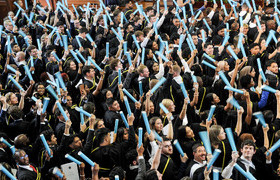UCT retains African lead in 2025 global rankings
05 September 2025 | Story Lara Dunwell. Photos Je’nine May. Read time 4 min.
The University of Cape Town (UCT) maintained its place in the top 201–300 band in the 2025 Shanghai Ranking’s Academic Ranking of World Universities (ARWU), released in August 2025. This marks another year as the highest-ranked university in South Africa and on the African continent.
ARWU, first published in 2003, evaluates over 2 500 institutions annually and publicly publishes the top 1 000 each year. Widely regarded as one of the most rigorous global rankings, it provides a long-term, evidence-based view of research excellence.
While UCT’s placement is consistent with previous years, unlike rankings such as Quacquarelli Symonds (QS) or Times Higher Education (THE), which can fluctuate year to year, ARWU measures stable academic indicators: Nobel Prizes, highly cited researchers, and publications in two of the world’s most prestigious journals, Nature and Science. UCT remaining firmly in the same band year after year is, according to Deputy Vice-chancellor for Research and Internationalisation Professor Jeff Murugan, an indication of UCT’s deep and sustained research strength in an increasingly competitive global context.
“These results confirm that UCT is not just competing at the highest international level but doing so consistently, even as the field grows more competitive. Endurance at this level requires research depth and a scholarly community that continues to make global impact,” said Professor Murugan.
Comparisons to the performance of peer South African universities highlight this strength. In ARWU, UCT and the University of the Witwatersrand are in the same band, while Stellenbosch University placed lower, in the 401–500 band.
Complementary global standing
UCT’s Vision 2030 guides all its priorities, including its pursuit of excellence in research, social responsiveness, and teaching and learning. This commitment comes through in the university’s ARWU outcomes, which are complemented by strong showings across other global rankings in 2025:
- QS World University Rankings: UCT climbed to 150th globally, its best-ever position and a rise of 55 places since 2022. This reflects growing recognition for the university’s research impact, international networks and sustainability efforts.
- THE World Rankings: UCT placed 180th, with noteworthy subject strengths in medicine, education, and law – highlighting its breadth of academic excellence.
Each ranking highlights different facets of UCT’s performance – from output and citation impact to engagement, sustainability and multidisciplinary reach.
“Rankings don’t capture everything that matters to a university on the continent, but they do spotlight the quality and impact of our research. For the university to hold its ground at this level given the shifting sands in the higher education landscape – while also rising in QS and maintaining Africa’s top spot across all major systems – underscores UCT as world leading, with an excellence that endures,” Murugan added.
Leadership in highly cited research
Among ARWU’s six performance indicators, one key measure is the number of Highly Cited Researchers (HCRs), as designated by Clarivate Analytics. These are scholars whose publications rank among the top 1% most cited in the Web of Science over the past decade, reflecting sustained influence.
In the latest listing, UCT boasts five out of South Africa’s 10 HCRs, more than any other national institution.
ARWU evaluates universities using six objective indicators:
- number of alumni winning Nobel Prizes and Fields Medals (10%)
- number of staff winning Nobel Prizes and Fields Medals (20%)
- number of highly cited researchers (20%)
- number of articles published in Nature and Science (20%)
- number of articles indexed in major Web of Science indices (20%)
- per capita academic performance (10%)
 This work is licensed under a Creative Commons Attribution-NoDerivatives 4.0 International License.
This work is licensed under a Creative Commons Attribution-NoDerivatives 4.0 International License.
Please view the republishing articles page for more information.










